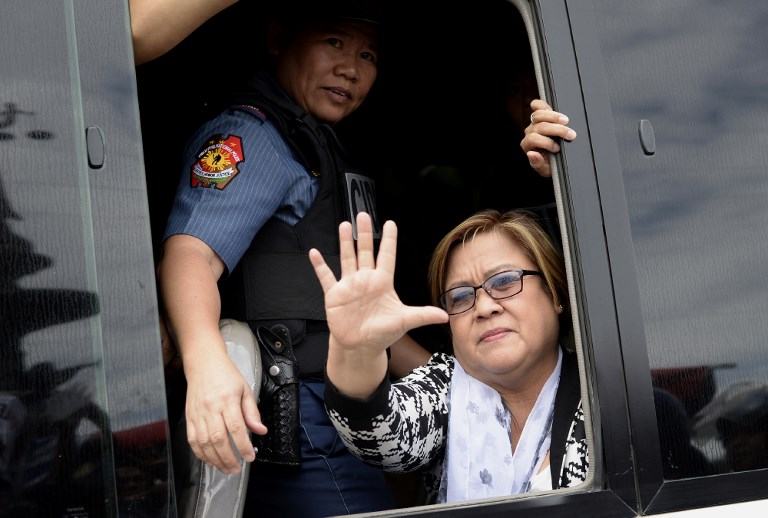
/ AFP Photo / Noel Celis
(Eagle News) – The Supreme Court has allowed media to cover the trial of the drug-related cases filed against Senator Leila de Lima pending before the Muntinlupa regional trial court.
The Court en banc directed the clerk of court of the Muntinlupa RTC to “grant courtroom access to as many media representatives as may be accommodated” during the hearings of De Lima’s drug cases.
This order was specified in a resolution dated October 16 in response to a request from Rappler seeking permission to cover the hearings.
The SC resolution was received on Friday, Nov. 23 by Rappler reporter Lian Buan who first wrote the high court on June 22 seeking permission to cover the hearings.
The high court also asked the two reporters’ associations covering the justice beat to send their proposed guidelines on the courtroom access for reporters covering the De Lima hearings at the Muntinlupa RTC.
The SC asked the Justice Reporters’ Association (JUROR) and the Justice and Court Reporters’ Association (JUCRA) to submit their recommendations within five days from receipt of the notice.
It technically deferred action on Buan’s request until JUROR and JUCRA have submitted their proposed guidelines.
But in the meantime, the court hearings shall be open to the media, the high court said.
“The number of media representatives to be granted access shall be no less than 4, and the determination of those who will be allowed inside shall be by drawing lots, which procedure shall be facilitated by the Branch Clerk of Court,” said the en banc.
“As manifested in the letter-request, no cameras or any other recording devices shall be allowed inside the courtroom,” it added.
Before this, Muntinlupa RTC Branch 206 Judge Lorna Navarro-Domingo had banned media coverage of the De Lima cases in her court room. But on November 5, she decided to inhibit from the case.
Domingo, acting presiding judge of Muntinlupa RTC branch 206, in her signed order said that she found “no sufficient ground to inhibit herself” from the trial as requested by De Lima, but that she decided just the same to recuse herself “to show good faith to all parties.”
She said that it is within her “discretionary power” to do so.
The issue arose out of De Lima’s perception that the judge was biased against her motion to disqualify some of the prosecution’s witnesses. The senator also resented that the judge had prevented media from covering the court hearings, and said that this “violated her right to an open and public trial.”
De Lima filed the motion for Judge Domingo to inhibit on October 15.






